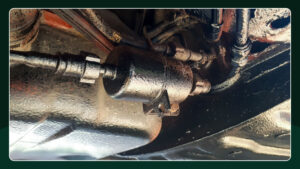
5 Symptoms of a Bad Fuel Filter
The fuel filter removes particles, contaminants, and pollutants from the fuel that enters the engine’s combustion chamber. When fuel is pumped into the fuel tank, there are several ways that debris can get into the engine. Particles around the tank cap can fall into the tank. The fuel tank itself can also have rust particles and deposits.
When fuel enters the tank, it mixes with these dirt particles. Without a fuel filter, these particles can easily clog the delicate injectors or even find their way into the combustion chamber. Problems arise when contaminated fuel enters the engine.
These tiny particles can reduce the engine’s performance and shorten its lifespan. Therefore, the fuel filter plays a very important role in the fuel system to keep your engine strong and running properly.
How a fuel filter works
Fuel filters are very similar to engine oil filters. Fuel enters one end of the filter and passes through a filter element (usually paper). The paper traps particles and contaminants, and clean gasoline comes out the other side.
Many fuel filters are designed with a flow direction that minimizes filter restriction. Pay attention to this arrow when installing a new fuel filter.
The 5 Most Common Symptoms of a Faulty Fuel Filter
When you go to a professional auto service to change your oil, the service technician will tell you that you should replace your fuel filter regularly. The reason is that your vehicle’s fuel filter doesn’t have a very long lifespan.
Newer vehicles may have longer change intervals, but you may be able to go up to 30,000 miles before your fuel filter needs replacing. After that, the fuel filter may become too clogged to perform its function properly.
Here are the five most common signs that you have a bad fuel filter that needs replacing.
1) High gas consumption
When your fuel filter goes bad, your fuel economy will also suffer. Perhaps your fuel filter is clogged, limiting the amount of fuel that can enter the engine. If your engine isn’t getting enough fuel, it will have to refuel faster to keep up with your driving demands. This means more fuel will be used than usual.
2) Check Engine Light
The engine control unit can detect if there is a problem with the fuel system. When this kind of problem affects the engine, the check engine light on the dashboard will come on.
3) Weak engine performance
A clogged fuel filter becomes a restriction in the fuel system. If your vehicle does not accelerate quickly or at all when you step on the accelerator, a faulty fuel filter may be the problem. This limits the engine’s ability to accelerate your vehicle when needed.
4) Engine Won’t Start
If your fuel filter is bad, your engine may not start at all. Perhaps not enough fuel is getting into the combustion chamber to run the engine. This problem may initially start with difficulty starting, but then progress to an issue where the engine won’t start at all.
5) Engine Stalls
You may be driving down the road and suddenly notice that your engine has stalled out. This occurs when the engine stops turning or suddenly slows down for no good reason, which causes the engine to stall, which is the worst thing that can happen while driving.

